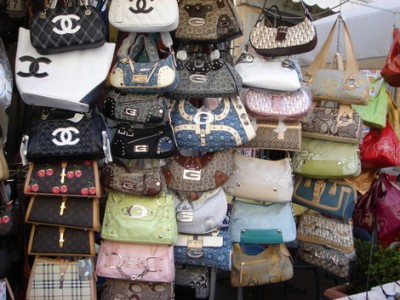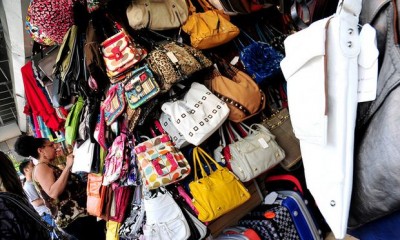 Even though Georgia native Audrey Estilette had heard about the counterfeit designer handbags sold in New York’s Chinatown, on her recent trip to the city, the fourteen year-old was more interested in exploring the authentic side of the neighborhood—or so she thought. Standing on Canal Street, surrounded by a swarm of vendors vying for her attention with whispers of Louis Vuitton and Chanel, it quickly became obvious to Estilette that sightseeing might have to take a back seat to bargain shopping. “Everywhere you turn, someone is trying to sell you a bag,” she says, she and her girlfriends proudly toting the knockoff Longchamp “Le Pliage” handbags they scored. “You don’t have places like this back home. You know, all out in the open and stuff.”
Even though Georgia native Audrey Estilette had heard about the counterfeit designer handbags sold in New York’s Chinatown, on her recent trip to the city, the fourteen year-old was more interested in exploring the authentic side of the neighborhood—or so she thought. Standing on Canal Street, surrounded by a swarm of vendors vying for her attention with whispers of Louis Vuitton and Chanel, it quickly became obvious to Estilette that sightseeing might have to take a back seat to bargain shopping. “Everywhere you turn, someone is trying to sell you a bag,” she says, she and her girlfriends proudly toting the knockoff Longchamp “Le Pliage” handbags they scored. “You don’t have places like this back home. You know, all out in the open and stuff.”
On an average day in Chinatown, illegal counterfeit vendors and their lookouts snake through the crowds, peddling their fake bags. For soccer mom Terry Johnson, on vacation from Florida, the illicit nature of the not-so-discreet transactions and the prospect of swinging a “designer bag” on her shoulder for a fraction of the price provides a strange thrill. “It’s a fun game to come to Chinatown to buy bags,” she says smiling, clutching four nondescript black plastic bags full of fake handbags. “I always get a rush from a good deal,” she adds, before zeroing in on a vendor holding a laminated sheet of images of Chanel bags. “Oh, let me try to get this guy.”
For years, Chinatown has been so synonymous with fakes—bags, watches, perfumes—that it’s become part of the fabric of the community. That’s why Chinatown’s Council member Margaret Chin is on a mission to rid the lower Manhattan neighborhood of its unofficial title as the Capital of Counterfeits with a proposed bill that would make it illegal to purchase counterfeit goods in her district.
“There is a huge growing demand for these low-cost illegal trademark goods,” explains Chin over the phone from her office. “There are illegal vendors crowding in front of the businesses and apartment buildings. Our constituents and people in the community are sick of living this way. Local businesses have to deal with shoppers coming in trying to negotiate a price, as if they were counterfeit. Why is that okay?”
If Chin’s bill becomes law, anyone caught buying any fake goods would be slapped with a misdemeanor charge that will come with a $1000 fine—or up to a year in jail. Italy and France have both adopted a similar law that goes after the shopper. “That’s crazy,” says Estilette, echoing the sentiment of most of the shoppers we spoke with. “Why don’t they just arrest these vendors? They are the ones selling it in front of everyone.”
That would seem to be the logical course of action. In fact, there’s already a law on the books that makes selling counterfeit goods illegal, although it’s difficult to enforce without a consistent police presence to catch vendors in the act. While there have been small victories in the fight against counterfeiters in Chinatown, like the 2008 police raid that unearthed over $1 million worth of knockoffs and closed down 32 illegal storefronts, with the NYPD stretched thin on issues like terrorism, the problem continues to grow. Accordingly, Chin believes it’s time police turn their focus on the buyer.
“This bill will stop shoppers from coming here specifically to purchase these counterfeit goods. They should experience what Chinatown really has to offer. If they want a bargain, there are a lot of places in the city where they can purchase a designer bag for an affordable price. I go to those places,” says Chin.
 But not everyone thinks locking up shoppers is the best way to clean up Chinatown. The Chinese Chamber of Commerce’s David Louie thinks Chin’s efforts are misplaced. “What’s the goal? To get rid of the sell of counterfeit goods, right? You don’t have to be a Dick Tracy to figure out who is selling illegal goods. Why not enforce the law that’s already on the books? If they wanted to enforce it, they would,” offers Louie. “But it’s certainly not gonna help our image if we start looking up tourists.” While it was difficult finding vendors willing to talk about the proposed legislation, one laughed at the idea of the bill saying, “It’s never going to pass. No counterfeit, no tourist, no money!”
But not everyone thinks locking up shoppers is the best way to clean up Chinatown. The Chinese Chamber of Commerce’s David Louie thinks Chin’s efforts are misplaced. “What’s the goal? To get rid of the sell of counterfeit goods, right? You don’t have to be a Dick Tracy to figure out who is selling illegal goods. Why not enforce the law that’s already on the books? If they wanted to enforce it, they would,” offers Louie. “But it’s certainly not gonna help our image if we start looking up tourists.” While it was difficult finding vendors willing to talk about the proposed legislation, one laughed at the idea of the bill saying, “It’s never going to pass. No counterfeit, no tourist, no money!”
“Poor tourists and their bags, I’m tired of hearing that,” says an exasperated Paul Cantor, who’s in full support of Chin’s proposed bill. “They know what they are doing and they should suffer the consequences. How do you allow straight out lawlessness to exist out in the open?” Cantor, a community board member, has lived in the neighborhood for 16 years. “Why do I have to ask them to move from my doorway so I can get in and then the vendor yells at me? They punched a neighbor who asked one of them to move from in front of his building. There is no reason why at the very least the people out there selling can’t be cognizant of who lives in the neighborhood. I know who they are.”
If arguments about the poor quality of life and revenue loss in Chinatown don’t do much to dissuade shoppers from coming to the area for knockoffs, than Robert Barchiesi of the International Anti Counterfeiting Coalition hopes the sobering facts behind the production of cheap fakes will have shoppers thinking twice before bargaining for a Gucci tote replica.
Shoppers need to be educated on the big issues linked to counterfeit goods, like child labor, prostitution, gangs, and in some instances, terrorism.
But even when confronted with the moral arguments against purchasing counterfeit goods, Johnson says that her $95 Louis Vuitton bag or $200 Chanel purse isn’t responsible for the world’s ills. “I’m not hurting anyone. Sorry if I can’t afford the $2000 version.”
Says Rory Chadwick of Midtown Authentic, a reputable consignment shop that sells vintage designer bags, “I know people who don’t have a lot of money and want to get a nice bag. Every week, they save up or buy a vintage bag for half the price. That’s the right thing to do. Instead, these people are cutting corners with these cheap bags.” An expert at detecting fakes for over 16 years, Chadwick sent an email to Chin when the bill was announced to offer support, along with his help in training the NYPD in spotting knockoffs. “It’s not just one person getting one bag. Now, people are coming from Florida and buying 200 bags, and then selling them on eBay or Craigslist as the real thing. Council Member Chin’s bill may be a landmark stepping stone to combating counterfeit bags.”
Enforcing the law and starting a dialogue on the illicit counterfeit trade—as well as debunking the notion that it’s a victimless crime—might be the first step to dealing with Chinatown’s counterfeit vending issues. Still, it’s difficult to image legislation will be anything more than a stopgap, when the real problem here is our insatiable appetite for status symbols, at any cost.
Link
Blackbookmag.com – Fake Out: The Crackdown on Chinatown’s Counterfeit Empire
- Write of Passage - October 28, 2013
- Old School Mood Boards - June 17, 2013
- Chloe Resort 2014 - June 12, 2013





